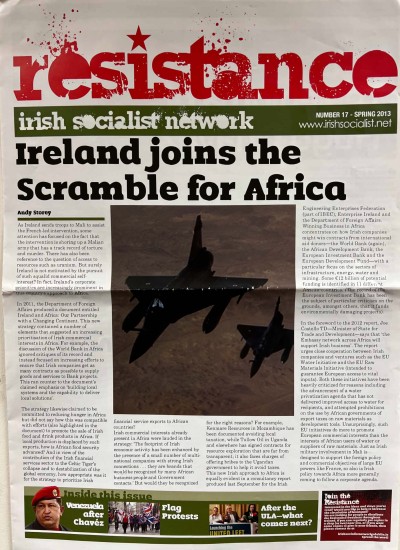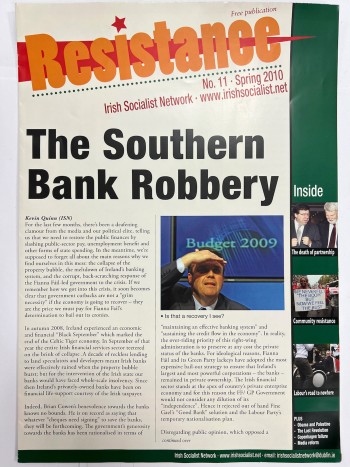Resistance, No. 17

| Date: | 2013 |
|---|---|
| Organisation: | Irish Socialist Network |
| Publication: | Resistance [ISN] |
| Issue: | Number 17 Spring 2013 |
Contributors:
Info | Colin Coulter, Clare Daly, Henry Silke, Andy Storey, Ed Walsh |
| Type: | Publication Issue |
| View: | View Document |
| Discuss: | Comments on this document |
| Subjects: |
Please note: The Irish Left Archive is provided as a non-commercial historical resource, open to all, and has reproduced this document as an accessible digital reference. Copyright remains with its original authors. If used on other sites, we would appreciate a link back and reference to The Irish Left Archive, in addition to the original creators. For re-publication, commercial, or other uses, please contact the original owners. If documents provided to The Irish Left Archive have been created for or added to other online archives, please inform us so sources can be credited.
Commentary From The Cedar Lounge Revolution
25th September 2024
This document joins others in the Archive from the Irish Socialist Network, and more are to come. As an aside there are a number of formats used by the magazine over the years – from A2 sheets that fold out to this one which is A4 four page.
The front page article notes:
As Ireland sends troops to Mali to assist the French-led intervention, some attention has focused on the fact that the intervention is shoring up a Malian army that has a track record of torture and murder. There has also been reference to the question of access to resources such as uranium. But surely Ireland is not motivated by the pursuit of such squalid commercial self-interest?
And:
Just as Irish military involvement in Mali is designed to support the foreign policy and commercial objectives of large EU powers like France, so also is Irish policy towards Africa more generally coming to follow a corporate agenda.
There’s a piece by Clare Daly – at that point a ULA TD for Dublin North where she argues that:
Bringing together groups with a different history was never going to be easy. But rather than pooling their strength in the interest of taking the movement forward, the existing groups tried to out-recruit each other to the detriment of the bigger project. But that project remains. Activists in the ULA are determined to keep this project alive. The United Left will be launched as a broad-based, bottom-up alternative to give trade unionists and community activists the chance to come together and push the struggle forward. We don’t have all the answers but we hope that we are asking the right questions.
The establishment and their media are hell-bent on trying to discredit the idea of an alternative. They attack us because they are fearful of people organising. Don’t be intimidated: we are only beaten when we stop fighting. This is a weak, unpopular government. It’s time to take them on.
Ed Walsh writes about the death of Hugo Chávez and the enigma of his political persona.
There’s another piece by Henry Silke on what comes after the ULA. He suggests:
When a scandal broke involving Mick Wallace–a developer turned TD who avoided tax and workers’ pension payments and was close to the SP’s Dalystand -it. the ULA was not able to withClare But the underlying structural problems long preceded the Wallace affair. The SP believed-very early on-that the ULA hadn’t attracted enough members and opposed any movement towards it becoming a party. It seemed to attach no value to the uniting of the left (including unaffiliated leftists) under a political banner.
Colin Coulter writes about how:
Nationalism-whether British or Irish-has nothmg . to offer workers in the six counties other than division and distraction. At a time when many working-class children on either side of the border are going to school on an empty stomach, it is worth remembering that a flag makes for a very poor breakfast.
There’s also a piece from Sráid Marx/www.irishmarxism.net that concludes:
The trade unions have focused on the threat to jobs and of privatization but have not highlighted the main reason for the change-making sectarian discrimination easier. The sharing of sectarian privileges in the Stormont Executive means that while this appears currently to be of benefit to Protestants, a new Minister would be perfectly free to discriminate the other way. Housing then becomes subject to arbitrary sectarian judgments for both Protestants and Catholics. The changes to housing are part and parcel of welfare changes from which no one will benefit. Socialists should campaign against Nelson McCausland’s plans but demand that tenants themselves-along with housing staff-should have control.
More from Resistance [ISN]
Resistance [ISN] in the archive




Comments
You can also join the discussion on The Cedar Lounge Revolution
No Comments yet.
Add a Comment
Comments can be formatted in Markdown format . Use the toolbar to apply the correct syntax to your comment. The basic formats are:
**Bold text**
Bold text
_Italic text_
Italic text
[A link](http://www.example.com)
A link